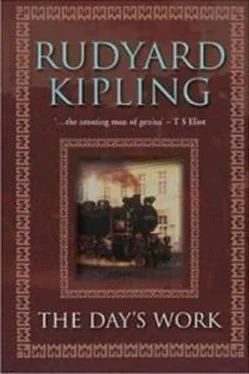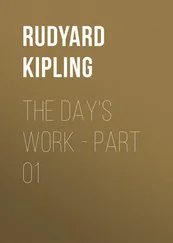Джозеф Киплинг - The Day's Work - Volume 1
Здесь есть возможность читать онлайн «Джозеф Киплинг - The Day's Work - Volume 1» весь текст электронной книги совершенно бесплатно (целиком полную версию без сокращений). В некоторых случаях можно слушать аудио, скачать через торрент в формате fb2 и присутствует краткое содержание. Год выпуска: 2014, Издательство: epubBooks Classics, Жанр: Прочие приключения, на английском языке. Описание произведения, (предисловие) а так же отзывы посетителей доступны на портале библиотеки ЛибКат.
- Название:The Day's Work - Volume 1
- Автор:
- Издательство:epubBooks Classics
- Жанр:
- Год:2014
- ISBN:нет данных
- Рейтинг книги:3 / 5. Голосов: 1
-
Избранное:Добавить в избранное
- Отзывы:
-
Ваша оценка:
- 60
- 1
- 2
- 3
- 4
- 5
The Day's Work - Volume 1: краткое содержание, описание и аннотация
Предлагаем к чтению аннотацию, описание, краткое содержание или предисловие (зависит от того, что написал сам автор книги «The Day's Work - Volume 1»). Если вы не нашли необходимую информацию о книге — напишите в комментариях, мы постараемся отыскать её.
The Day's Work - Volume 1 — читать онлайн бесплатно полную книгу (весь текст) целиком
Ниже представлен текст книги, разбитый по страницам. Система сохранения места последней прочитанной страницы, позволяет с удобством читать онлайн бесплатно книгу «The Day's Work - Volume 1», без необходимости каждый раз заново искать на чём Вы остановились. Поставьте закладку, и сможете в любой момент перейти на страницу, на которой закончили чтение.
Интервал:
Закладка:
"Oho! Then it is true. 'When Brahm ceases to dream, the Gods die.' Now I know, indeed, what he meant. Once, too, the guru said as much to me; but then I did not understand. Now I am wise."
"What?" said Findlayson, over his shoulder.
Peroo went on as if he were talking to himself. "Six–seven–ten monsoons since, I was watch on the fo'c'sle of the ehwah—the Kumpani's big boat–and there was a big tufan; green and black water beating, and I held fast to the life–lines, choking under the waters. Then I thought of the Gods—of Those whom we saw tonight"—he stared curiously at Findlayson's back, but the white man was looking across the flood. "Yes, I say of Those whom we saw this night past, and I called upon Them to protect me. And while I prayed, still keeping my lookout, a big wave came and threw me forward upon the ring of the great black bowanchor, and the Rewah rose high and high, leaning towards the lefthand side, and the water drew away from beneath her nose, and I lay upon my belly, holding the ring, and looking down into those great deeps. Then I thought, even in the face of death: If I lose hold I die, and for me neither the Rewah nor my place by the galley where the rice is cooked, nor Bombay, nor Calcutta, nor even London, will be any more for me. 'How shall I be sure,' I said, that the Gods to whom I pray will abide at all?' This I thought, and the Rewah dropped her nose as a hammer falls, and all the sea came in and slid me backwards along the fo'c'sle and over the break of the fo'c'sle, and I very badly bruised my shin against the donkey–engine: but I did not die, and I have seen the Gods. They are good for live men, but for the dead…They have spoken Themselves. Therefore, when I come to the village I will beat the guru for talking riddles which are no riddles. When Brahm ceases to dream the Gods go."
"Look up–stream. The light blinds. Is there smoke yonder?"
Peroo shaded his eyes with his hands. "He is a wise man and quick. Hitchcock Sahib would not trust a rowboat. He has borrowed the Rao Sahib's steam launch, and comes to look for us. I have always said that there should have been a steam–launch on the bridge works for us."
The territory of the Rao of Baraon lay within ten miles of the bridge; and Findlayson and Hitchcock had spent a fair portion of their scanty leisure in playing billiards and shooting black–buck with the young man. He had been bear–led by an English tutor of sporting tastes for some five or six years, and was now royally wasting the revenues accumulated during his minority by the Indian Government. His steam–launch, with its silverplated rails, striped silk awning, and mahogany decks, was a new toy which Findlayson had found horribly in the way when the Rao came to look at the bridge works.
"It's great luck," murmured Findlayson, but he was none the less afraid, wondering what news might be of the bridge.
The gaudy blue and white funnel came down–stream swiftly. They could see Hitchcock in the bows, with a pair of opera–glasses, and his face was unusually white. Then Peroo hailed, and the launch made for the tail of the island. The Rao Sahib, in tweed shooting–suit and a seven–hued turban, waved his royal hand, and Hitchcock shouted. But he need have asked no questions, for Findlayson's first demand was for his bridge.
"All serene! Gad, I never expected to see you again, Findlayson. You're seven koss down–stream. Yes; there's not a stone shifted anywhere; but how are you? I borrowed the Rao Sahib's launch, and he was good enough to come along. Jump in."
"Ah, Finlinson, you are very well, eh? That was most unprecedented calamity last night, eh? My royal palace, too, it leaks like the devil, and the crops will also be short all about my country. Now you shall back her out, Hitchcock. I—I do not understand steam engines. You are wet? You are cold, Finlinson? I have some things to eat here, and you will take a good drink."
"I'm immensely grateful, Rao Sahib. I believe you've saved my life. How did Hitchcock—"
"Oho! His hair was upon end. He rode to me in the middle of the night and woke me up in the arms of Morpheus. I was most truly concerned, Finlinson, so I came too. My head–priest he is very angry just now. We will go quick, Mister Hitchcock. I am due to attend at twelve forty–five in the state temple, where we sanctify some new idol. If not so I would have asked you to spend the day with me. They are dam–bore, these religious ceremonies, Finlinson, eh?"
Peroo, well known to the crew, had possessed himself of the inlaid wheel, and was taking the launch craftily up–stream. But while he steered he was, in his mind, handling two feet of partially untwisted wire–rope; and the back upon which he beat was the back of his guru.
A Walking Delegate
According to the custom of Vermont, Sunday afternoon is salting–time on the farm, and, unless something very important happens, we attend to the salting ourselves. Dave and Pete, the red oxen, are treated first; they stay in the home meadow ready for work on Monday. Then come the cows, with Pan, the calf, who should have been turned into veal long ago, but survived on account of his manners; and lastly the horses, scattered through the seventy acres of the Back Pasture.
You must go down by the brook that feeds the clicking, bubbling water–ram; up through the sugar–bush, where the young maple undergrowth closes round you like a shallow sea; next follow the faint line of an old county–road running past two green hollows fringed with wild rose that mark the cellars of two ruined houses; then by Lost Orchard, where nobody ever comes except in cider–time; then across another brook, and so into the Back Pasture. Half of it is pine and hemlock and Spruce, with sumach and little juniper bushes, and the other half is grey rock and boulder and moss, with green streaks of brake and swamp; but the horses like it well enough—our own, and the others that are turned down there to feed at fifty cents a week. Most people walk to the Back Pasture, and find it very rough work; but one can get there in a buggy, if the horse knows what is expected of him. The safest conveyance is our coupe. This began life as a buckboard, and we bought it for five dollars from a sorrowful man who had no other sort of possessions; and the seat came off one night when we were turning a corner in a hurry. After that alteration it made a beautiful salting–machine, if you held tight, because there was nothing to catch your feet when you fell out, and the slats rattled tunes.
One Sunday afternoon we went out with the salt as usual. It was a broiling hot day, and we could not find the horses anywhere till we let Tedda Gabler, the bobtailed mare who throws up the dirt with her big hooves exactly as a tedder throws hay, have her head. Clever as she is, she tipped the coupe over in a hidden brook before she came out on a ledge of rock where all the horses had gathered, and were switching flies. The Deacon was the first to call to her. He is a very dark iron–grey four–year–old, son of Grandee. He has been handled since he was two, was driven in a light cart before he was three, and now ranks as an absolutely steady lady's horse—proof against steam–rollers, grade–crossings, and street processions.
"Salt!" said the Deacon, joyfully. "You're dreffle late, Tedda."
"Any—any place to cramp the coupe?" Tedda panted. "It weighs turr'ble this weather. I'd 'a' come sooner, but they didn't know what they wanted—ner haow. Fell out twice, both of 'em. I don't understand sech foolishness."
"You look consider'ble het up. 'Guess you'd better cramp her under them pines, an' cool off a piece."
Tedda scrambled on the ledge, and cramped the coupe in the shade of a tiny little wood of pines, while my companion and I lay down among the brown, silky needles, and gasped. All the home horses were gathered round us, enjoying their Sunday leisure.
Читать дальшеИнтервал:
Закладка:
Похожие книги на «The Day's Work - Volume 1»
Представляем Вашему вниманию похожие книги на «The Day's Work - Volume 1» списком для выбора. Мы отобрали схожую по названию и смыслу литературу в надежде предоставить читателям больше вариантов отыскать новые, интересные, ещё непрочитанные произведения.
Обсуждение, отзывы о книге «The Day's Work - Volume 1» и просто собственные мнения читателей. Оставьте ваши комментарии, напишите, что Вы думаете о произведении, его смысле или главных героях. Укажите что конкретно понравилось, а что нет, и почему Вы так считаете.












